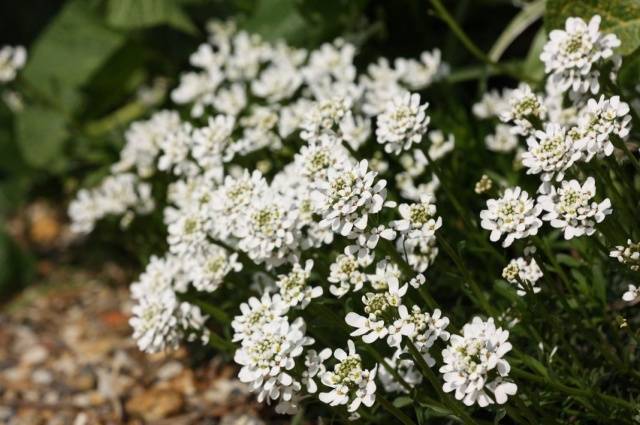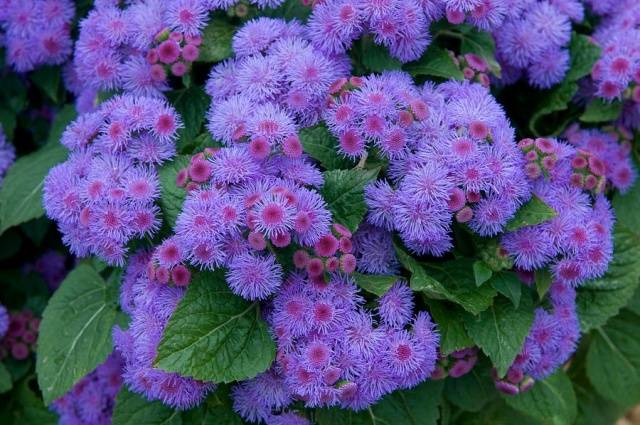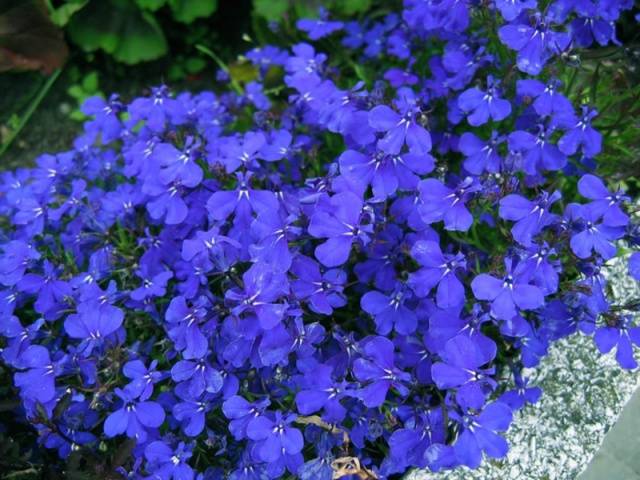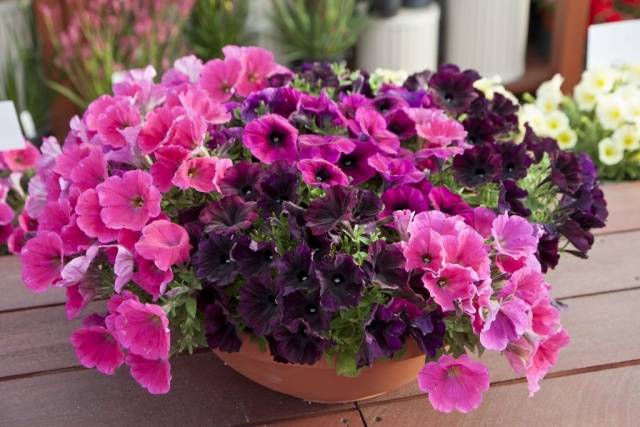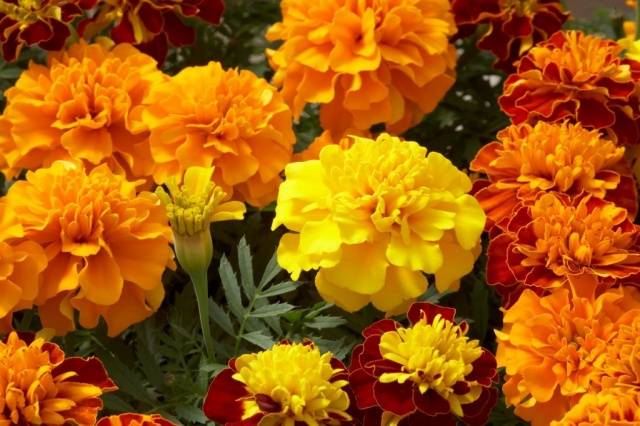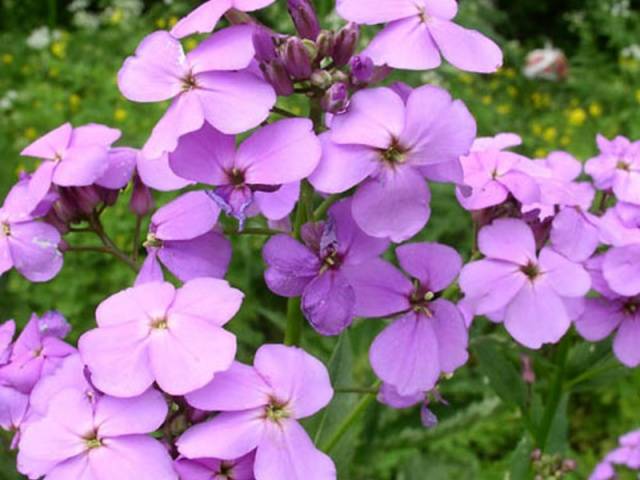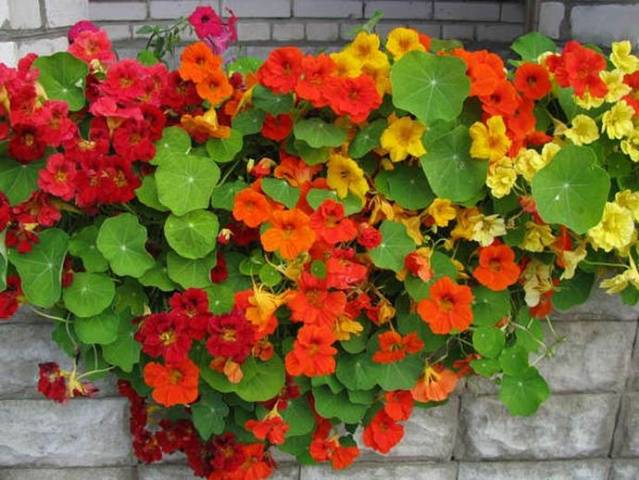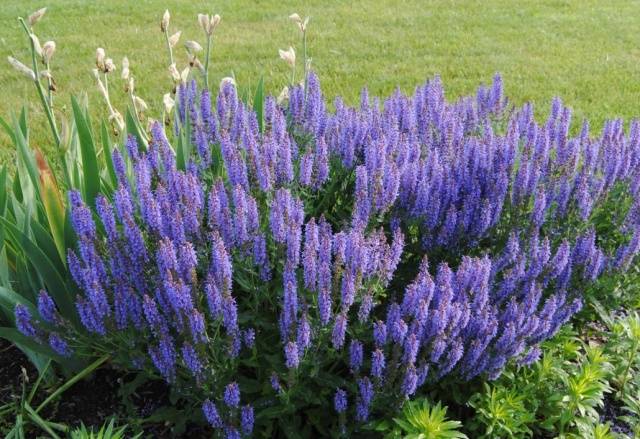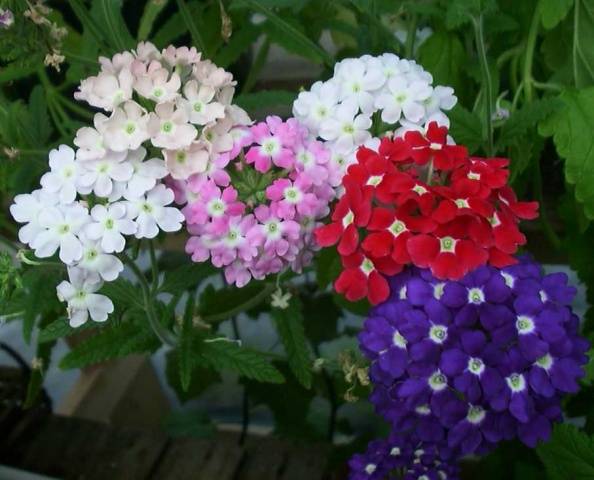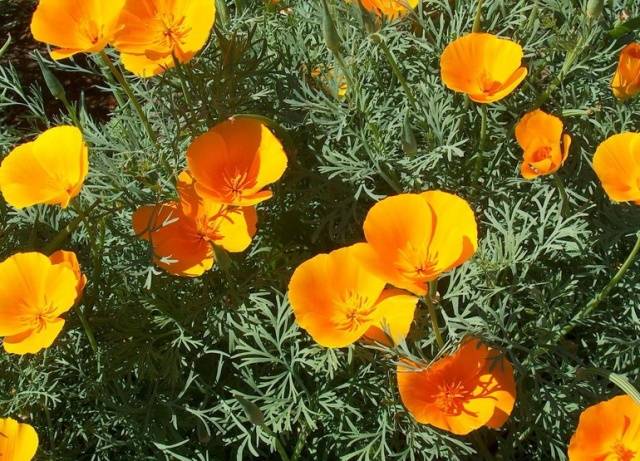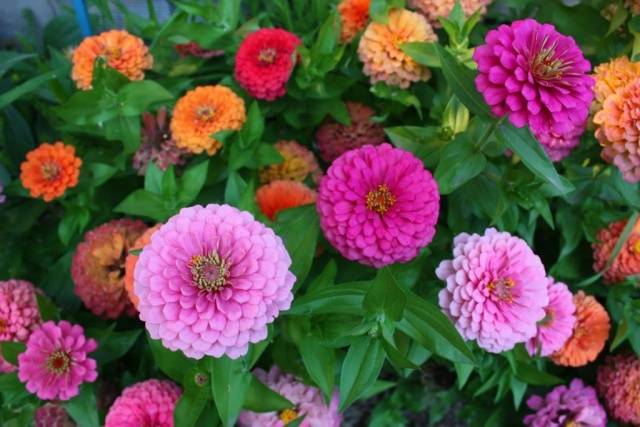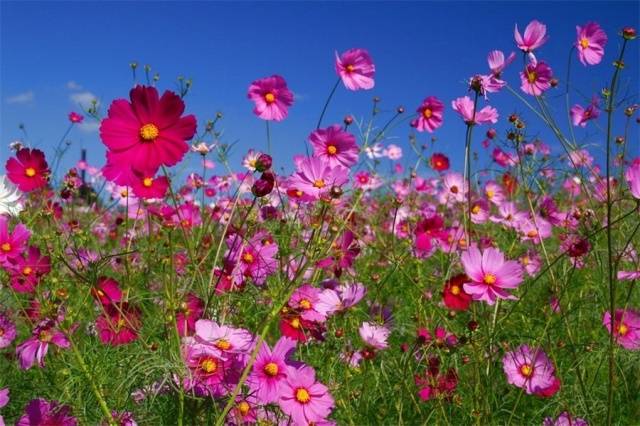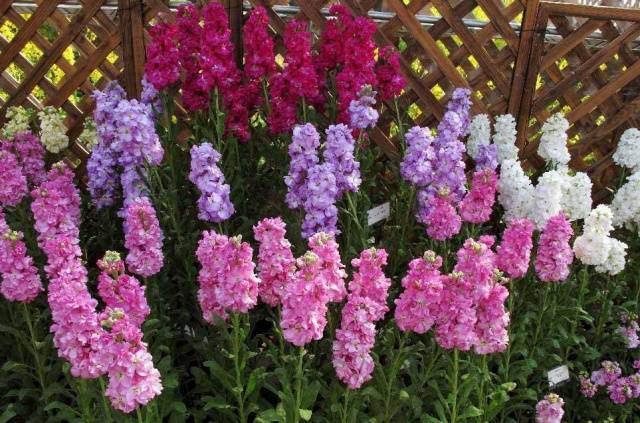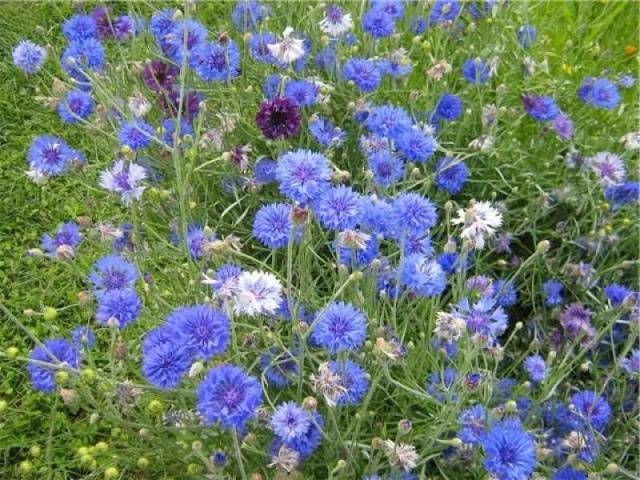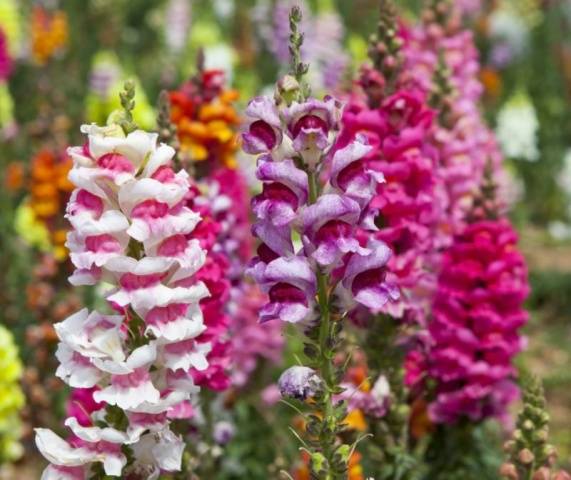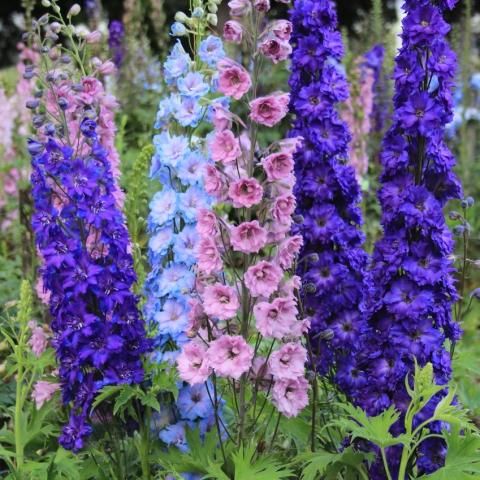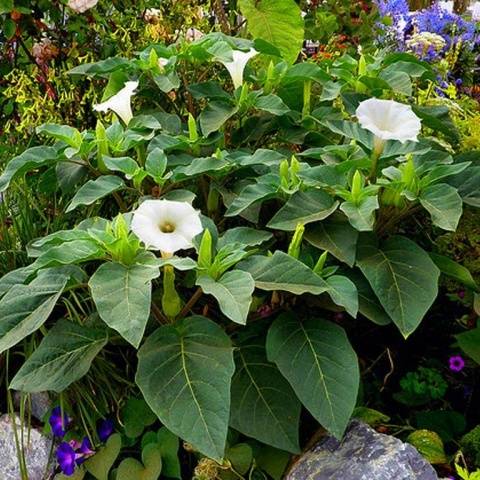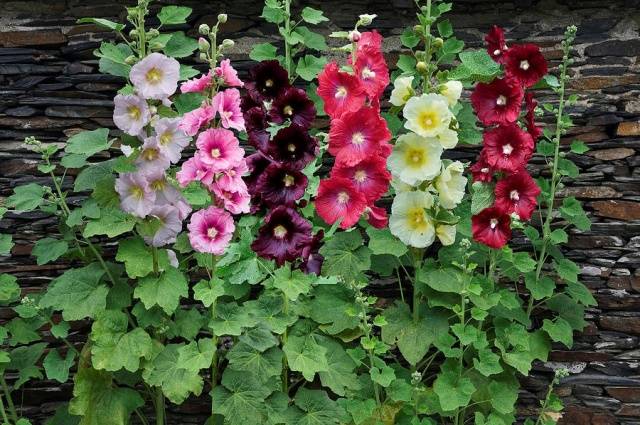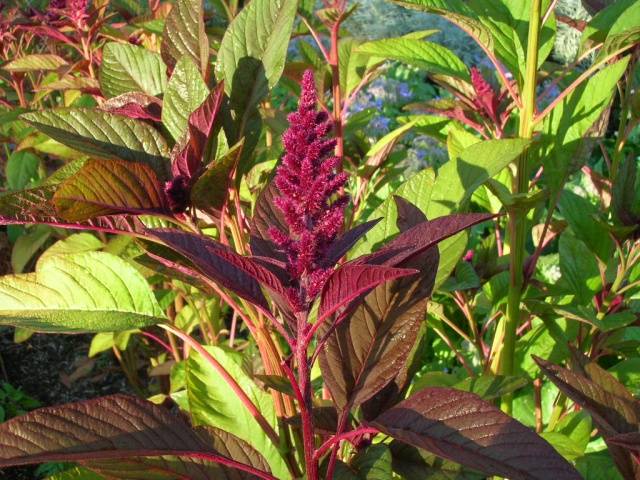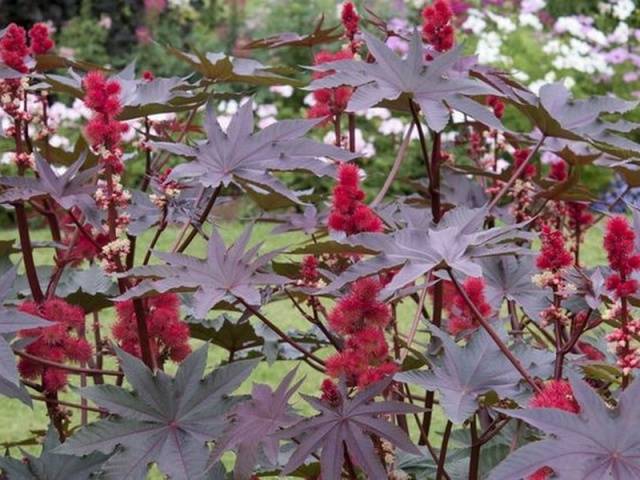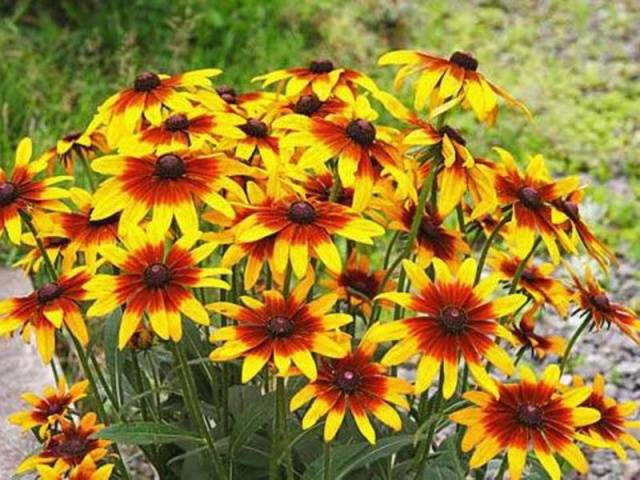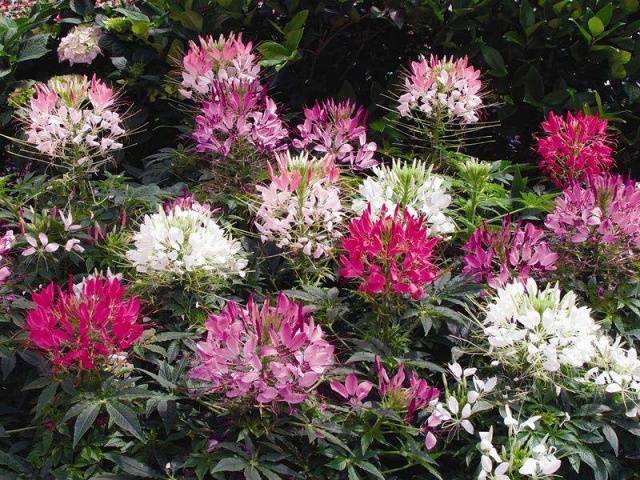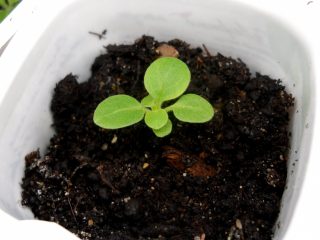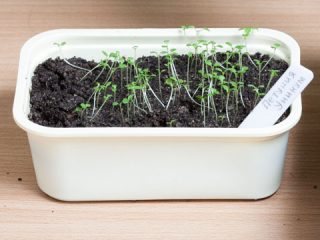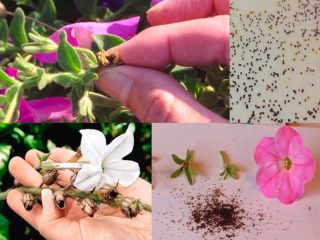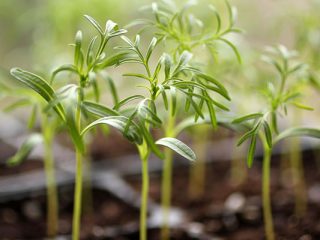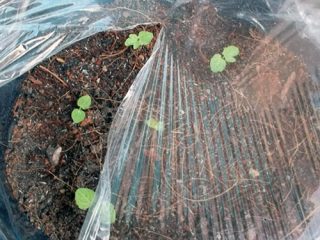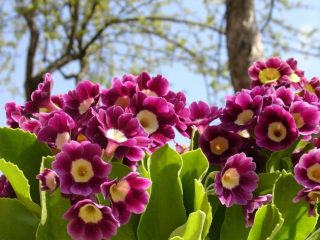Annuals flowers in the garden and dacha decorate flower beds and lawns, they are planted along fences, paths and walls of houses. Most annuals prefer lighted areas, regular watering and feeding.
Annual flowers are propagated by seed. In warm regions, they are planted directly into open ground. If there is a high probability of late frosts, then first get seedlings at home.
Low-growing annuals
Low and ground cover plants reach a height of no more than 30 cm. They are used to decorate borders, rockeries and multi-flowered flower beds. Below are the photos and names of garden annual flowers.
Iberis
Iberis is a branchy, spreading plant up to 30 cm. Shoots are erect or creeping. Flowers up to 1 cm in size are collected in umbellate inflorescences.
Iberis is distinguished by abundant flowering and a delicate honey aroma. Behind the inflorescences of white, pink, purple, purple, greenery is often not visible. Iberis grows on drained soil, is unpretentious, tolerates slight darkening. Flowering begins in May and lasts two months.
Ageratum
A compact bush with small fluffy inflorescences that combine two shades. The plant is compact, 10-30 cm high.
Ageratum does not tolerate frost, prefers illuminated areas. The plant is undemanding to soil, but sensitive to excess moisture.
Ageratum is grown in seedlings, transferred to an open place in June. Flowering begins in June and lasts until October.
Lobelia
Unpretentious annual flower for a summer residence no more than 50 cm high. Shoots are thin, spread along the ground. Flowering occurs from June and ends in autumn. The plant is planted in the beds, in pots and flowerpots.
Inflorescences are bright blue with a white center. Lobelia grows in lighted areas, requires frequent watering. The soil for planting is loosened and fertilized with humus. Lobelia tolerates cold snaps well.
Petunia
Petunia forms compact bushes no more than 30 cm. The flowers are large, with a diameter of 8 to 12 cm. The plant is presented in a rich color range from white, pale pink shades to rich scarlet and purple color. Flowering begins in June and lasts until autumn frosts.
Petunia prefers an abundance of light and warmth. In cool and damp weather, bud formation slows down. An annual needs moderate watering; in a drought, the intensity of moisture application is increased.
Marigold
Marigolds look like a low bush up to 30 cm. The plant is covered with orange, yellow or red double inflorescences. Carnation flowers, up to 5 cm in size.
Marigolds are undemanding to soil and moisture. Abundant flowering is observed in sunny areas and in partial shade. Marigolds are planted in the area to repel pests. Flowering continues until the autumn cold snap.
Night violet
An annual garden flower with powerful erect stems, on which pink, lilac or purple flowers bloom. Small flowers 1-2 cm in size are collected in a dense racemose cap. Night violet has a pleasant aroma.
Night violet is light and moisture-loving. Flowering begins in May and lasts until July, after which the pods with seeds ripen. Moisture stagnation negatively affects the development of annuals.
Nasturtium
Annual with creeping shoots up to 1 m long.Nasturtium is used as a ground cover plant, then it completely covers the garden bed. The flowers are semi-double, 5 cm in diameter, yellow, orange, burgundy and brown.
Nasturtium grows in lighted areas. The soil is prepared drained with a moderate organic content. An annual needs regular watering.
Medium-sized annuals
Medium-sized plants include plants up to 1 m high. Medium-sized annual flowers in the garden and dacha are used to decorate flower beds, rockeries, mixborders.
Sage
Sage is a medicinal and ornamental plant up to 80 cm high. On branched, powerful shoots, two-lipped purple flowers bloom, collected in racemose inflorescences.
For replanting sage, open lighted areas with drained soil are chosen. The plant does not develop on clay soils. When caring for sage, be sure to loosen the soil and provide moisture. The annual is resistant to frost, but does not tolerate excess moisture.
Verbena
An annual garden flower up to 50 cm high. It blooms from June to autumn cold snaps. The flowers are fragrant, small, collected in corymbose inflorescences 10 cm in size. The color is white, pink, red, purple, blue.
Verbena is unpretentious, but blooms more abundantly in a lighted place. The annual prefers loamy fertilized soils, is resistant to diseases, tolerates a lack of moisture and temporary cold snaps.
Eschsholzia
The plant is planted in groups, then numerous shoots intertwine and cover the free space in the beds. The leaves are glaucous, the flowers are white, red, orange, 5 cm in size.
The height of the escholzia is up to 60 cm. It blooms from July until the onset of frost. The plant is light-requiring, prefers light drained soil, drought-resistant. Reacts positively to fertilizing with mineral fertilizers.
Zinnia
Zinnia produces single double flowers of yellow, purple, red. The plant is compact, up to 50 cm high. It looks most impressive when planted in groups.
For planting zinnias choose lighted areas protected from the wind. The plant prefers drained soil, fertilized with humus and minerals. The first inflorescences are formed in July, the subsequent ones - until autumn. Zinnia does not fade for a long time after cutting.
Kosmeya
Annual up to 0.8 m high. Lush bush with delicate leaves and large inflorescences 10 cm in size. Kosmeya has a pink, white, purple hue. Abundant flowering from mid-summer to frost. The flowers are chamomile-like with simple or double petals.
The plant prefers lighted areas, is resistant to drought and cold snaps. Kosmeya grows on any soil, but abundant flowering is achieved when grown in loose fertile soil.
Mattiola
A beautiful, unpretentious plant that can withstand freezing temperatures. The flowers have an original shape and are collected in spike-shaped inflorescences. Stems are erect, up to 80 cm high. The color range is extensive, including pastel and rich shades.
Mattiola prefers lighted areas, does not tolerate stagnant moisture and prolonged drought. The annual is grown on fertile loam or sandy loam soils. The plant is regularly fed and watered in drought.
knapweed
A decorative annual up to 80 cm high. The plant is branched, at the ends of the shoots terry inflorescences 5 cm in size are formed. Depending on the variety, the cornflower has a purple, blue, white, pink, raspberry hue.
The plant blooms in June. By cutting off wilting inflorescences, flowering can be extended by 1-2 months. Cornflower is planted in sunny areas. The soil is enriched with lime. Cornflower does not tolerate excess moisture.
Snapdragon
An ornamental plant grown as an annual. The flower reaches a height of 1 m. Flowering begins in June and lasts until late autumn. The flowers grow in the form of racemose inflorescences. Coloring is varied and includes shades of red, yellow, orange, blue.
Snapdragon grows in illuminated areas, undemanding to the quality of the soil and temperature regime. In a drought, the plant is watered abundantly.
Tall annuals
Tall plants are suitable for decorating the central part of the flower bed, they are planted along the fences and walls of buildings. The height of such annuals reaches 1 m or more. Photos and names of garden annual flowers are shown below.
Delphinium
A perennial grown as an annual plant. Differs in erect stems up to 2 m high. Leaves are large, flowers are collected and cylindrical inflorescences.
The plant needs good lighting and constant access to moisture. In the spring it is fed with organic matter, in the summer - with complex fertilizer. Delphinium is resistant to temporary cold snaps. Flowers are suitable for cutting.
Dope
An open field plant that grows up to 1 m in height. 10-12 tubular flowers bloom on each bush. The size of the flower reaches 20 cm in length and 10 cm in diameter. The life of a flower is 1 day, new buds bloom every day.
Datura gives off a pleasant aroma in warm weather. The plant reacts well to heat and light, tolerates short frosts. Datura is abundantly watered and fed.
Mallow
A perennial flower grown as an annual. Height up to 2 m, the stem is covered with simple or double flowers. Flower size 8-12 cm. There are varieties of mallow red, pink, purple, white, blue.
Mallow is undemanding to the ground, prefers illuminated places, and is drought-resistant. Before the formation of buds, the plant is fed with complex fertilizer.
Amaranth
Annual garden flower with alternate lanceolate leaves, pointed at the tips. Inflorescences are collected in bunches and panicles of red, yellow, green or purple color. The flower reaches a height of 3 m.
Amaranth is propagated by seedlings, after planting in the ground, the plants are watered abundantly. Seedlings are protected from spring frosts. In the future, abundant watering is not required.
Castor oil plant
Annual 2-10 m high with bare straight stems of brown or green hue. The leaves are large, consist of several lobes. The flowers have no decorative properties. After flowering, fruits are formed in the form of a spherical box measuring 3 cm.
Castor oil plant is undemanding to growing conditions, but it develops faster on nutritious moist soils.
Rudbeckia
Plant up to 3 m high with oval-shaped leaves. The flowers are large, up to 15 cm in diameter, orange and yellow. Inflorescences in the form of baskets, located on high stems.
Rudbeckia grows in any soil, but it needs abundant sunlight. An annual needs moisture, the volume of which is increased during the flowering period.
Cleoma
A flower with a powerful root system and strong stems, reaches 1.5 m. Flowers are collected in carpal inflorescences of white, pink, yellow, red. A distinctive feature is the elongated stamens.
Cleoma grows in sunny areas without drafts, undemanding to the quality of the soil. Care includes watering in drought, loosening the soil, weeding weeds and top dressing with complex fertilizer.
Conclusion
Annual flowers are an excellent decoration for recreation areas, summer cottages and garden plots. Using annuals allows you to change your garden design every year. When choosing a flower, the climatic conditions of the region and the composition of the soil are taken into account. Most of the popular annuals are unpretentious in growing.
